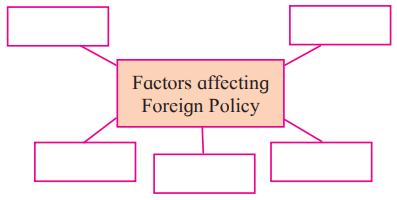Question Answers For All Chapters – Political Science Class 9
Solutions
Exercise
1. Choose the correct option from the given options and complete the statements.
(1) This was the main objective behind establishing the Indian Atomic Energy Commission-
(a) enhance military capacity
(b) conduct nuclear tests
(c) to stop the proliferation of nuclear weapons
(d) production of atomic energy
Answer: (d) production of atomic energy
Explanation: The document states that the main purpose of India’s nuclear energy program, started after independence, was electricity generation, though it also aimed at military capability later.
(2) The following is now the objective of all the nations of the world-
(a) atomic development
(b) economic development
(c) nuclear test
(d) security system
Answer: (b) economic development
Explanation: The text highlights that in the post-Cold War period, nations prioritize economic growth and trade over just military or political relations.
(3) The ………. is an important aspect of India’s foreign policy-
(a) free economic policy
(b) interdependence
(c) non-alignment
(d) nuclear development
Answer: (c) non-alignment
Explanation: Non-alignment is a key feature of India’s foreign policy, especially during the Cold War, as it allowed India to stay neutral and foster peace.
(4) India conducted nuclear tests in 1974 at-
(a) Shriharikota
(b) Thumba
(c) Pokharan
(d) Jaitapur
Answer: (c) Pokharan
Explanation: The document mentions that India conducted its first nuclear tests in 1974, and historically, these took place at Pokharan.
2. State whether the following statements are true or false. Give reasons for your answer.
(1) Pandit Nehru contributed towards improving Sino-Indian relations.
Answer: False
Reason: The document states that Pandit Nehru shaped India’s foreign policy with a focus on peace and non-alignment, but it also notes that India faced conflict with China. It was Atal Bihari Vajpayee who contributed significantly to improving Sino-Indian relations, not Nehru.
(2) Atal Bihari Vajpayee took lead in improving relations with Pakistan.
Answer: True
Reason: While the document specifically mentions Vajpayee’s contribution to improving Sino-Indian relations, historically, he also took steps like the Lahore Bus Yatra (1999) to improve ties with Pakistan, showing his leadership in this area.
3. Explain the following concepts.
(1) India’s Foreign Policy
India’s foreign policy guides its relations with other countries, focusing on peace, non-alignment, and economic growth. It is shaped by the Constitution’s Article 51 and adapts to changing times. It aims to protect national interests while promoting global harmony.
(2) National Interest
National interest refers to goals that safeguard a country’s independence, sovereignty, and unity. It includes economic development to ensure strength and self-reliance. Foreign policy works to achieve these priorities for the nation’s benefit.
(3) World Peace
World peace means a world free from war, supported by India through non-alignment and disarmament. It involves resolving disputes peacefully, as per Article 51. India believes peace helps all nations prosper.
4. What is your opinion about the fact that world peace is threatened due to nuclear preparedness?
I believe nuclear preparedness threatens world peace by creating fear and tension among nations. The destructive power of nuclear weapons, like those used in Hiroshima, risks massive harm. Reducing them through talks is better for global stability.
5. Answer the following questions in brief.
(1) On what principles is India’s foreign policy based?
India’s foreign policy is based on peace, non-alignment, and respect for international law. It promotes friendly relations and peaceful dispute resolution. Self-reliance and security are also key principles.
(2) Who has contributed to improving Sino-Indian relations?
Atal Bihari Vajpayee significantly improved Sino-Indian relations. He initiated dialogues with China as Prime Minister. His efforts built trust and cooperation.
(3) Write the objectives of India’s foreign policy.
India’s foreign policy aims to promote peace, protect sovereignty, and ensure economic growth. It seeks friendly ties with all nations and safeguards citizens abroad. It also supports global security and disarmament.
6. Prepare the following concept map.
Factors Affecting Foreign Policy
Geographical Location:
- Size, population, coastline, and resources shape foreign policy.
- Neighboring countries affect decisions (e.g., Pakistan, China).
Political System:
- Democracy involves Parliament in making foreign policy.
- Federal states like Tamil Nadu or West Bengal influence it too.
Economy:
- Strong economy means less dependence and a free foreign policy.
- Trade and economic security are key factors.
Political Leadership:
- Leaders like Nehru (non-alignment) and Vajpayee (Sino-Indian ties) guide it.
- Prime Minister and ministers play a big role.
Administrative Factors:
- Ministry of External Affairs, embassies, and officers help make decisions.
- They collect and analyze information for the policy.


Leave a Reply